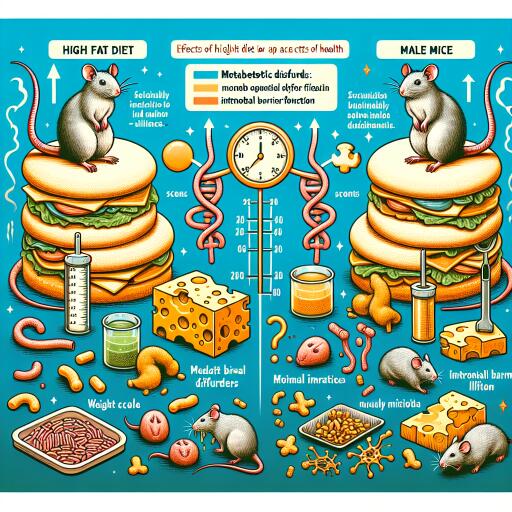Exploring the Sex-Dependent Effects of High Fat Diet on Metabolic Health and Gut Microbiome in Mice
In a groundbreaking study aimed at understanding how diet influences metabolic disorders and the gut microbiome differently across genders, researchers have embarked on a comprehensive exploration of the effects of a high-fat diet (HFD) on male and female mice. This investigation delves into the intricate dynamics between dietary fats, metabolic health, and the microbial universe residing within the gut, providing new insights into personalized nutritional strategies.
The study utilized six-week-old C57BL/6J male and female mice, which were subjected to either a standard diet (SD) or a high-fat diet for 14 weeks. The focus was on examining changes in glycemic control, gut microbiota, intestinal barrier function, and inflammation both in systemic circulation and adipose tissues.
Methodological Insight
Upon a controlled acclimatization period, the mice were divided into groups receiving either the standard diet or a high-fat diet, with the latter comprising 60% calories from fat, primarily sourced from lard and soybean oil. The researchers meticulously monitored body weight and composition, employing protocols approved by the regional ethics committee, ensuring adherence to ethical standards and ARRIVE guidelines.
Glycemic Control Assessment
Through Oral Glucose Tolerance Tests (OGTT) and Insulin Tolerance Tests (ITT), the researchers assessed the mice’s ability to manage blood glucose levels post-high-fat diet consumption. Additionally, a novel approach was used to evaluate intestinal barrier function by administering FITC-dextran and measuring its plasma fluorescence, providing insights into the permeability of the gut barrier—a key factor in metabolic health.
Comprehensive Biomarker Analysis
Blood and tissue samples yielded a plethora of data, measuring levels of critical hormones and cytokines such as insulin, leptin, resistin, adiponectin, IL-6, and TNFα, which are pivotal to understanding the systemic and localized inflammatory response induced by a high-fat diet. Moreover, the analysis extended to metabolic and liver health markers, showcasing a thorough investigative approach.
Exploring the Gut Microbiome and Intestinal Health
Central to this study was the examination of the gut microbiome and its correlation with dietary impacts. Utilizing advanced sequencing techniques, researchers analyzed the microbial composition within the cecal content, shedding light on how a high-fat diet influences the gut’s microbial ecosystem differently in males and females.
Molecular Insights from Adipose Tissue and Colon Samples
The molecular analyses extended to adipose tissues and colon samples, where expressions of genes related to inflammatory response and gut barrier function were evaluated. This provided a molecular basis for the observed physiological changes, integrating the study’s findings from macroscopic observations to molecular mechanisms.
Gleaning Insights on Short-Chain Fatty Acids
Short-chain fatty acids (SCFAs), pivotal for gut health and metabolism, were measured, revealing significant diet-induced shifts. The detailed analysis of SCFAs composition contributed to understanding the complex interaction between diet, gut microbiota, and metabolic health.
Data Analysis and Ethical Compliance
The study’s comprehensive approach encompassed advanced statistical analyses to discern the nuanced effects of a high-fat diet based on sex. Importantly, the research was conducted with stringent adherence to ethical standards and regulatory guidelines, ensuring the welfare of the animal subjects and the integrity of the data collected.
Concluding Reflections
This research marks a significant step forward in our understanding of how high-fat diets impact metabolic health differently in males versus females, offering profound implications for personalized nutrition and disease prevention strategies. By unraveling the intricate links between diet, gut microbiota, and inflammation, this study paves the way for targeted interventions aimed at mitigating diet-induced metabolic disorders across the sexes.
The findings underscore the importance of considering sex-dependent differences in dietary studies and their potential impact on human health, driving home the message that what we eat influences our bodily systems in complex and gender-specific ways.










